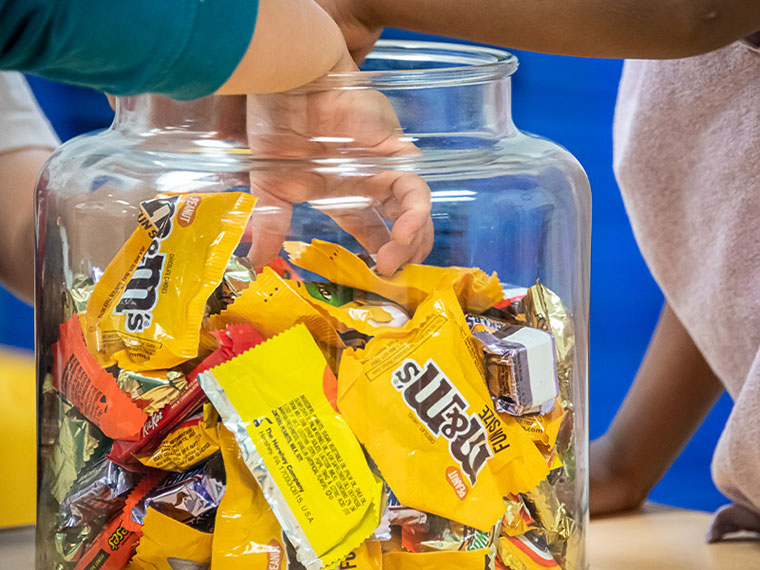The information presented on this page may be dated. It may refer to situations which have changed or people who are no longer affiliated with the university. It is archived as part of Mississippi State University's history.
Typically, the bond between grandparent and grandchild often means a comforting and nurturing presence, warm hugs, and an abundance of sweet treats. But many grandparents find themselves in the role of caretaker. In fact, according to the U.S. Census, over 7 million grandparents are living with grandchildren under the age of 18. Mississippi State researchers have been observing the relationship between grandparents as caretakers and childhood obesity rates, which have been rising. In a cross-college collaboration, a MAFES scientist is among the first, nationwide, to take a closer look.
Dr. Rahel Mathews, assistant professor in the Department of Food Science, Nutrition and Health Promotion and MAFES scientist, and Dr. Danielle Nadorff, associate professor in the Department of Psychology, are researching who the caregiver is and its effect on child nutrition and obesity rates in the U.S.
"My research interest is in nutrition, food insecurity, and community health," said Mathews. "I study trends of population health and the factors that contribute to the trend. My goal is to see what we can do differently to solve the problem." According to the MSU study, child obesity rates are at a surprising 17% in the United States, potentially leading to a rise in health detriments such as diabetes and hypertension. As a result of poor nutritional knowledge, an increased consumption of fast food and sweets, as well as snacking occurring during screen time, child obesity rates in the U.S. have been on the rise and nearly tripled over the past 30 years. Solutions need to prioritize different perspectives. By confirming statistical trends in large datasets and showing a priority need to work with grandparents and the children in their care, solutions may be found. The team set out to determine if children who lived with their grandparents would report poorer dietary intake, a higher Body Mass Index (BMI) level, which is a measure of body fat based on height and weight, or increased food insecurity compared to those who lived in homes with parents.
"We're looking for what kind of influences can happen with caregivers who aren't parents, including grandparents," said Mathews.
Taking data from a 2009-2010 Health Behavior in School-Aged Children (HBSC) survey in more than 300 schools, over 12,000 students ages 11, 13, and 15 were surveyed regarding their home situation and were separated accordingly: parents only (those who lived with either a father or mother or both, but no grandparents), skipped-generational (those who lived with a grandfather or grandmother or both, but no parents) and multi-generational (those who lived in a home with at least one parent and one grandparent).
Results concluded that children living in multi-generational and skipped-generational homes reported poorer dietary behaviors including an increased intake of fast food, soft drinks, and sweets. They also recorded higher levels of food insecurity and higher BMI levels.
"Children reported more unhealthy snacking in households while living with only grandparents. Hunger was reported more often in multi-generational households," said Mathews. "These results support that caregiver type, especially caregiving grandparents, may be a significant predictor of children's BMI, nutrition, and food security."
Researchers say the next steps include investigating important statistics that confirm the correlation between the influence of grandparents and child nutrition and obesity by observing a wider variety of data sets. They plan to do this by comparing how one versus two caregivers affects availability of shared resources. "This research could lead to an emphasis on helping grandparents make better informed nutritional choices that will help cultivate a healthier lifestyle for future generations," said Mathews. "Tailoring nutrition education to the needs of grandparents could contribute to both the improved health of grandparents and the reduction of child obesity."
As grandparents continue to care for their grandchildren, MAFES researchers are finding ways to help support them as they raise the next generation.
This research is funded by the Mississippi Agricultural and Forestry Experiment Station.
This Research Could Lead To An Emphasis On Helping Grandparents Make Better Informed Nutritional Choices That Will Help Cultivate A Healthier Lifestyle For Future Generations. Tailoring Nutrition Education To The Needs Of Grandparents Could Contribute To Both The Improved Health Of Grandparents And The Reduction Of Child Obesity
Dr. Rahel Mathews
Behind the Science

Rahel Mathews
Assistant Professor
Education: B.S., Psychology, University of Michigan; M.P.H, International Health and Development, Tulane University; Ph.D., Nutrition, Mississippi State University
Years At MSU: 4
Focus: Public health nutrition
Passion At Work: I am passionate about preventing chronic disease morbidity and mortality by providing data and research that can influence health education, dietetics, and health practices and policies.

